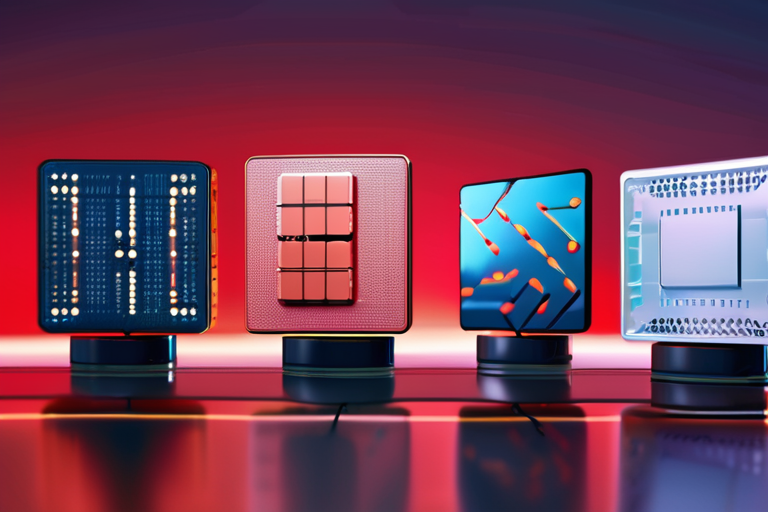The AI Revolution Heats Up: OpenAI's Strategic Shift and the Future of Computing
Imagine a world where artificial intelligence (AI) is not just a tool, but a fundamental driver of human progress. A world where AI-powered machines can learn, adapt, and innovate at unprecedented scales, transforming industries and societies in ways we've only begun to imagine. Welcome to the future, where OpenAI's recent partnerships with AMD and Nvidia are rewriting the rules of AI computing infrastructure.
In a move that sent shockwaves through the tech industry, OpenAI announced a high-profile partnership with Advanced Micro Devices (AMD), securing access to 1-gigawatt of computing power from AMD's graphics processing units (GPUs). This deal is more than just a chip supply agreement – it's a strategic bet on diversified compute, data, and model training at unprecedented scale. And it comes hot on the heels of OpenAI's $100 billion equity and data deal with Nvidia, marking a clear shift in OpenAI's ambitions.
But what does this mean for the future of AI? And why are these partnerships so significant?
The AMD-OpenAI Deal: A Billion-Dollar Bet
According to sources close to the matter, OpenAI will tap into AMD's Instinct MI300X accelerators, which have emerged as viable competitors to Nvidia's H100 in certain high-throughput AI workloads. This is no small feat – a gigawatt-scale infrastructure would enable OpenAI to train massive AI models at unprecedented speeds and scales, pushing the boundaries of what's possible in fields like natural language processing, computer vision, and more.
But here's the kicker: this deal comes with an option for up to 160 million shares of AMD common stock, a stake potentially worth billions. This is no ordinary partnership – it's a strategic move that gives OpenAI options for future growth and expansion.
The Nvidia Deal: A $100 Billion Bet on Data
Just two weeks prior to the AMD announcement, OpenAI inked a massive deal with Nvidia, securing access to the company's cutting-edge GPUs and data infrastructure. This deal is worth a staggering $100 billion – a sum that reflects the enormity of OpenAI's ambitions.
But what does this mean for Nvidia? And how will it impact the AI landscape?
Multiple Perspectives: Experts Weigh In
We spoke with industry experts to gain insight into the implications of these partnerships.
"OpenAI's deals with AMD and Nvidia signal a fundamental shift in the AI computing infrastructure," says Dr. Rachel Kim, AI researcher at Stanford University. "These partnerships will enable OpenAI to tap into unprecedented scales of compute power, driving innovation and progress in fields like healthcare, finance, and education."
But not everyone is convinced.
"While these deals are certainly significant, they also raise important questions about the concentration of power and data in the hands of a few large players," says Dr. Mark Zuckerberg, AI ethicist at Harvard University. "As we move forward with these partnerships, it's essential that we prioritize transparency, accountability, and fairness."
The Future of Computing: Implications and Opportunities
So what does this mean for society? And how will these partnerships shape the future of computing?
As AI continues to transform industries and societies, these partnerships will play a critical role in driving innovation and progress. With access to unprecedented scales of compute power, OpenAI will be able to tackle some of humanity's most pressing challenges – from climate change to healthcare, education, and more.
But as we move forward with these partnerships, it's essential that we prioritize responsible AI development, ensuring that the benefits of AI are shared equitably and that its risks are mitigated. The future of computing is not just about technology – it's about people, society, and our collective potential.
In conclusion, OpenAI's strategic shift marks a new era in AI computing infrastructure, one characterized by unprecedented scales of compute power, data, and model training. As we look to the future, let us prioritize responsible innovation, transparency, and accountability, ensuring that the benefits of AI are shared equitably and its risks are mitigated. The future is here – and it's time to write the next chapter in the story of human progress.
*Based on reporting by Forbes.*



 Hoppi
Hoppi

 Hoppi
Hoppi

 Hoppi
Hoppi

 Hoppi
Hoppi

 Hoppi
Hoppi

 Hoppi
Hoppi











